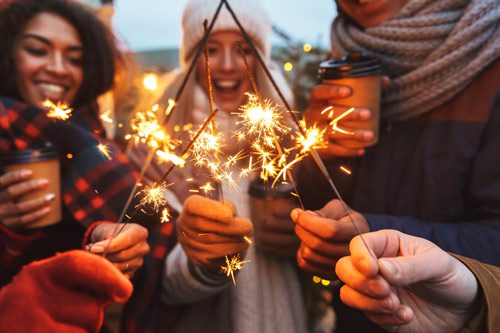
Set Realistic Expectations
Often, our unhappiness during the holiday season comes from setting unrealistic expectations. For example, if you know you don’t get along well with your parents the other 364 days of the year, it’s unlikely you’ll have a stress-free Christmas dinner no matter what you do.
Don’t expect people to give beyond their abilities. If your mother is notoriously self-absorbed, don’t expect her to become caring and empathetic for the holidays. You’ll be happier if you choose to simply enjoy her cooking and get your emotional needs met elsewhere.
Create reasonable boundaries for yourself. You are not required to spend time with people who make you feel bad about yourself and your recovery efforts. If you’d rather have a quiet dinner at home than travel three states to see Aunt Mildred, who won’t stop reminding you of every mistake you made before entering treatment, there’s nothing wrong with choosing to put yourself first.
Decide What You’re Comfortable Sharing
You don’t “owe” anyone your recovery story. If you’re not comfortable sharing details about your treatment, it’s fine to simply tell your extended family that you realized you had a substance abuse problem and you’re now getting the care you need to live a wellness-focused lifestyle. As with any other medical condition, you’re entitled to your privacy.
If you’re worried about how to turn down offers of alcohol from people who don’t know the full details of your recovery, remember that there are plenty of reasons people abstain from drinking that have nothing to do with addiction. Some people don’t drink because they’re taking medication, trying to lose weight, don’t like the taste, acting as a designated driver, or have religious beliefs that discourage alcohol consumption. Keeping a non-alcoholic beverage in your hand can reduce the odds you’ll be offered a drink you have to turn down, but keep in mind you can always say “not tonight” and leave it at that.
Create New Traditions
Recovery is a new beginning, which means this is the perfect year to create new traditions that don’t center around drinking or using drugs. Look for opportunities to strengthen relationships with the people who mean the most to you. For example, teaching your kids how to make traditional family recipes you enjoyed as a child or taking them caroling around the neighborhood can be a wonderful way to make new memories.
If you’re having trouble getting into the holiday spirit, create a new tradition that focuses on giving back. You might volunteer to serve a meal at a local homeless shelter, collect items for a holiday toy drive, or bring a care package to an elderly neighbor who doesn’t have family nearby. Acts of kindness can inspire feelings of gratitude that will make the holiday season more meaningful.
Make Time for Self-Care
The hustle and bustle of the holiday season can make it tempting to skimp on exercise and sleep. However, ignoring these important self-care practices can put your recovery at risk by making it harder to resist cravings. If necessary, don’t be afraid to trim your schedule to a more manageable level so you still have time to continue the healthy habits you learned during your time in residential treatment.
It’s also important to avoid overindulging in sugary sweets this holiday season. Occasional small treats are fine, but overdoing it can lead to blood sugar spikes that can cause you to feel moody and irritable. Keep your blood sugar levels stable with a diet that includes plenty of protein and fiber.
Have a Contingency Plan
When it comes to avoiding relapse, it’s always best to be proactive. Think about what you’ll do if you’re at an event that becomes uncomfortable or if you start to experience cravings that you can’t resist. Do you have a friend you can call for support? Is there a quiet place you can go to decompress? If you’re traveling, do you know where to find nearby 12-Step meetings?
Talking about how you’ll handle specific concerns with your therapist can help you feel more prepared for any potential holiday pitfalls. At Mountain Laurel Recovery Center, we’re here to provide the support you need to confidently embrace a life free from the burden of addiction.
